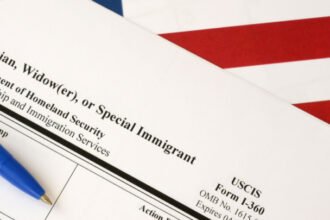For Nigerian professionals aiming to build a career and life in the United States, the I-140 Immigrant Petition for Alien Worker is an essential part of the employment-based immigration pathway. This petition, filed by a U.S.-based employer, paves the way for a foreign worker’s permanent residency. It’s especially valuable for highly skilled individuals, professionals with advanced degrees, and other qualified workers.
This guide outlines the I-140 petition process for Nigerian workers, highlighting eligibility, application steps, benefits, and challenges. Equipped with this information, Nigerian workers and their sponsoring employers can navigate the process with clarity and efficiency.
What is the I-140 Immigrant Petition?
The I-140 Immigrant Petition for Alien Worker is filed by U.S. employers to classify foreign nationals for employment-based permanent residency. This petition applies to multiple employment-based categories, especially relevant for professionals with advanced skills or education. Once approved, the I-140 serves as a foundational step in applying for an employment-based Green Card.
Key Benefits of the I-140 Petition
- Pathway to a Green Card: The I-140 is a critical requirement in the journey toward U.S. permanent residency, providing Nigerian professionals with greater job stability.
- Inclusion of Family Members: Once approved, the primary applicant’s spouse and children under 21 may also qualify for Green Cards.
- Long-Term Employment Prospects: The petition establishes a permanent employment opportunity in the U.S. and allows professionals to work towards eventual citizenship.
For more details, visit the USCIS I-140 Petition Information Page.
Employment-Based Categories Eligible for the I-140
The I-140 petition applies to three major employment-based categories:
- EB-1 (Priority Workers): Individuals with extraordinary abilities, professors, researchers, and multinational executives.
- EB-2 (Advanced Degree and Exceptional Ability Workers): Professionals with advanced degrees or exceptional abilities in fields such as business, science, or the arts. Many Nigerian professionals qualify for this category if they hold master’s degrees or higher.
- EB-3 (Skilled Workers, Professionals, and Unskilled Workers): This category covers skilled workers with at least two years of experience, professionals with bachelor’s degrees, and some unskilled positions.
Each category comes with specific eligibility criteria, and U.S. employers must determine the most fitting category for their prospective employees based on education, skills, and job requirements.
Eligibility Requirements for Nigerian Workers
General Eligibility Requirements
- Permanent Job Offer: The applicant must have a job offer for a permanent position from a U.S.-based employer.
- Employer Sponsorship: Only the employer can submit the I-140 petition on behalf of the employee, demonstrating their ability to pay the offered wage.
- Labor Certification (PERM): For most EB-2 and EB-3 petitions, the employer must obtain Labor Certification from the U.S. Department of Labor, confirming that no qualified U.S. workers are available for the role.
Specific Requirements by Category
- EB-1: Suitable for individuals with significant achievements or executive roles in multinational companies.
- EB-2: Designed for advanced degree holders or individuals with exceptional skills in specific fields.
- EB-3: Available to skilled workers with at least two years of training or experience, as well as some unskilled workers.
Steps in the I-140 Petition Process
The I-140 petition involves several key steps, including PERM certification, document submission, and USCIS review.
Step 1: Obtain PERM Labor Certification
For EB-2 and EB-3 petitions, the employer must secure Labor Certification (PERM) from the Department of Labor (DOL). The PERM process requires employers to demonstrate that hiring a foreign worker will not negatively impact wages and employment conditions for U.S. workers.
- Estimated Processing Time: The PERM process generally takes several months and involves job advertisement requirements to ensure no U.S. worker is available for the role.
Step 2: File Form I-140 with USCIS
Once PERM certification is obtained (if required), the employer files Form I-140 with U.S. Citizenship and Immigration Services (USCIS). The petition includes information on the job, the applicant’s qualifications, and the company’s ability to support the role.
- Required Documents:
- A detailed job offer letter
- Proof of qualifications, such as educational degrees or work experience
- Financial documents from the employer to prove their financial capability to pay the wage
Step 3: Payment of Filing Fees
The current filing fee for Form I-140 is $700, which must be paid at the time of submission. Employers can also opt for premium processing by paying an additional $2,500, expediting the review process to 15 days.
Step 4: USCIS Review and Decision
USCIS will review the I-140 petition and may issue an RFE (Request for Evidence) if additional documentation is required. The petition can result in approval, denial, or further review. If approved, USCIS forwards the case to the National Visa Center (NVC) for the next stages of processing.
Premium Processing for I-140 Petitions
Premium Processing is an optional service allowing employers to expedite the I-140 petition review to 15 days. This option is available for most I-140 cases and can be highly beneficial for Nigerian workers needing swift processing.
- Fee: The premium processing fee is $2,500 in addition to the standard filing fee.
- Advantages: Premium processing speeds up USCIS decisions and ensures faster communication if additional documents are required.
Visit the USCIS Premium Processing page for additional details on eligibility and fees.
Post-Approval Steps for the I-140 Petition
Once the I-140 is approved, Nigerian workers can proceed to the final stages of obtaining a Green Card. This process depends on the applicant’s location:
Adjustment of Status (For Applicants in the U.S.)
If the applicant is in the United States on a valid visa, they can file Form I-485 (Application to Adjust Status). This application allows the individual to transition from a temporary visa to permanent residency without leaving the U.S.
Consular Processing (For Applicants in Nigeria)
For Nigerian workers still residing in Nigeria, the case will be sent to the National Visa Center (NVC), which coordinates visa issuance through the U.S. Embassy in Abuja or the U.S. Consulate in Lagos. After visa issuance, applicants can enter the U.S. as permanent residents.
Priority Dates and Visa Bulletin
The I-140 petition is subject to the Visa Bulletin, a monthly update on immigrant visa availability based on priority dates. Nigerian applicants should regularly check the Visa Bulletin to stay informed about when their visa category becomes current.
Potential Challenges and How to Address Them
Requests for Evidence (RFE)
If USCIS requires more documentation, they issue an RFE (Request for Evidence). Common RFE requests include additional proof of the applicant’s qualifications, job details, or the employer’s financials. Working closely with immigration attorneys can help ensure all documentation is correctly submitted and improve the chances of a positive outcome.
Denials and Appeals
If USCIS denies the I-140, the employer has options to appeal or file a motion to reopen or reconsider. It’s essential to understand why the petition was denied, as this can help address gaps in future applications.
Delays in PERM Processing
Obtaining labor certification (PERM) can be a lengthy process, especially in industries with a large labor pool in the U.S. Starting early and ensuring thorough documentation are essential to avoid delays.
Key Tips for Nigerian Workers and Employers
- Plan for the PERM Process: EB-2 and EB-3 petitions usually require PERM certification, which can take several months. Employers and applicants should plan accordingly to prevent delays.
- Choose the Right Employment Category: Work with immigration professionals to determine whether EB-1, EB-2, or EB-3 is the most suitable category based on qualifications.
- Consider Premium Processing: For applicants in urgent need of processing, premium processing can reduce the wait time significantly.
- Track Visa Bulletin Updates: Monitoring priority dates through the Visa Bulletin helps applicants stay aware of the current wait times and prepare for consular interviews.
Frequently Asked Questions
1. How long does it take to process an I-140 petition?
Processing times vary, with regular processing ranging from 5 to 12 months and premium processing taking 15 days.
2. Can an I-140 petition be transferred to a new employer?
If a worker has an approved I-140 and changes employers, the new employer must file a fresh petition. However, in many cases, the priority date from the original I-140 can be retained.
3. What happens if my I-140 is denied?
The employer may appeal the denial, file a motion to reopen or reconsider, or submit a new petition addressing the issues in the initial application.
4. Can family members accompany the principal applicant?
Yes, spouses and children under 21 can be included in the Green Card application once the I-140 petition is approved.
Conclusion: Navigating the I-140 Petition for a Brighter Future in the U.S.
The I-140 Immigrant Petition offers Nigerian professionals a path toward permanent residency in the United States. With a sponsoring U.S. employer and careful adherence to eligibility and document requirements, Nigerian workers can realize their goal of securing a Green Card. Whether navigating the PERM labor certification or tracking priority dates, each step brings skilled Nigerian professionals closer to establishing a successful career and fulfilling life in the U.S.
For more information on the I-140 process and updates, visit the USCIS I-140 Information Page and consult with experienced immigration professionals to maximize the chances of success.



